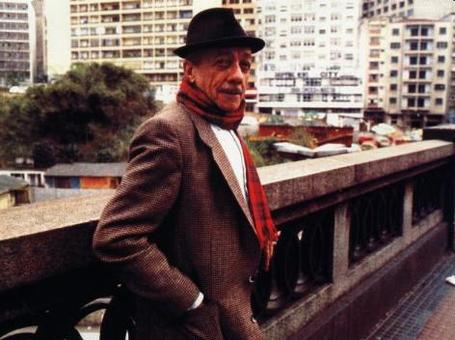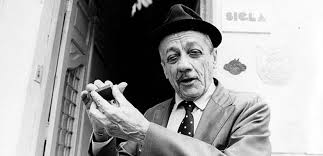Lyrics from "Véspera de Natal" by Adoniran Barbosa (1974)
Eu me lembro muito bem// I remember quite well
Foi numa véspera de natal// It was on a Christmas Eve
Cheguei em casa// I got home
Encontrei minha nega zangada, a criançada chorando// And found my nega (wife) angry, the children crying
Mesa vazia, não tinha nada.// An empty table, nothing on it
Foi numa véspera de natal// It was on a Christmas Eve
Cheguei em casa// I got home
Encontrei minha nega zangada, a criançada chorando// And found my nega (wife) angry, the children crying
Mesa vazia, não tinha nada.// An empty table, nothing on it
Saí, fui comprar bala mistura // I went out, I went to buy candy mix
Comprei também um pãozinho de mel// I also bought a little honey bread
E cumprindo a minha jura // And keeping my promise
Me fantasiei de papai noel//I dressed up as Santa Claus
Comprei também um pãozinho de mel// I also bought a little honey bread
E cumprindo a minha jura // And keeping my promise
Me fantasiei de papai noel//I dressed up as Santa Claus
Falei com minha nega de lado// I told my wife quietly
Eu vou subir no telhado//"I'm going to climb up on the roof
E descer na chaminé// And come down through the chimney
Enquanto isso você //And meanwhile you
Pega a criançada e ensaia o dingo-bel//Get the kids and teach them
'dingo-bel'" (Jingle Bells written phonetically in Portuguese)
Eu vou subir no telhado//"I'm going to climb up on the roof
E descer na chaminé// And come down through the chimney
Enquanto isso você //And meanwhile you
Pega a criançada e ensaia o dingo-bel//Get the kids and teach them
'dingo-bel'" (Jingle Bells written phonetically in Portuguese)
Ai meu deus que sacrifício// Oh my god, what a sacrifice
O orifíciu da chaminé era pequeno// The orifice of the chimney was small!
Pra me tirar de lá //To get me out of there
Foi preciso chamar// We needed to call
Os bombeiros// The fire department!
O orifíciu da chaminé era pequeno// The orifice of the chimney was small!
Pra me tirar de lá //To get me out of there
Foi preciso chamar// We needed to call
Os bombeiros// The fire department!
Lyrics from "Trem das onze" (1965)
Não posso ficar // I can't stay
Nem mais um minuto com você // Even another minute with you
Sinto muito, amor // I'm so sorry, dear
Mas não pode ser // But it just can't be
Moro em Jaçanã // I live in Jacanã
Se eu perder esse trem // If I miss the train
Que sai agora às onze horas// That leaves now at 11 pm
Só amanhã de manhã// The next is only tomorrow morning
(x2)
Nem mais um minuto com você // Even another minute with you
Sinto muito, amor // I'm so sorry, dear
Mas não pode ser // But it just can't be
Moro em Jaçanã // I live in Jacanã
Se eu perder esse trem // If I miss the train
Que sai agora às onze horas// That leaves now at 11 pm
Só amanhã de manhã// The next is only tomorrow morning
(x2)
E além disso, mulher// And what's more, woman
Tem outra coisa // There's something else
Minha mãe não dorme // My mom doesn't go to sleep
Enquanto eu não chegar // Until I get home
Tem outra coisa // There's something else
Minha mãe não dorme // My mom doesn't go to sleep
Enquanto eu não chegar // Until I get home
Sou filho único // I'm an only child
Tenho minha casa pra olhar // I have to guard our home!
Tenho minha casa pra olhar // I have to guard our home!
Bam zam zam zam zam zam
Quaiscalingudum
Quaiscalingudum
Quaiscalingudum (x2)
Quaiscalingudum
Quaiscalingudum
Quaiscalingudum (x2)
Quaisgudum, tchau!
-- Interpretation --
This
began as a post just about a favorite Brazilian Christmas samba --
"Véspera de Natal" -- but then I realized it is the first post about
Adoniran Barbosa, so I've included one of his classics, too: "Trem das
Onze." Alongside Paulo Vanzolini,
Barbosa is the best known and loved São Paulo samba composer of all
time. His songs "Trem das Onze" and "Saudosa Maloca" achieved widespread
and timeless popularity even in Rio - like Vanzolini's "Volta por cima" - which is a great feat for otherwise oft-snubbed samba paulista.
began as a post just about a favorite Brazilian Christmas samba --
"Véspera de Natal" -- but then I realized it is the first post about
Adoniran Barbosa, so I've included one of his classics, too: "Trem das
Onze." Alongside Paulo Vanzolini,
Barbosa is the best known and loved São Paulo samba composer of all
time. His songs "Trem das Onze" and "Saudosa Maloca" achieved widespread
and timeless popularity even in Rio - like Vanzolini's "Volta por cima" - which is a great feat for otherwise oft-snubbed samba paulista.
Barbosa
(born João Rubinato, August 6, 1912 - November 23, 1982) was the son of
Italian immigrants who settled in the interior of São Paulo. He
composed sambas in a humorous mix of Italian-Portuguese dialect and the caipira accent (like hillbilly or country bumpkin) that he grew up surrounded by.
(born João Rubinato, August 6, 1912 - November 23, 1982) was the son of
Italian immigrants who settled in the interior of São Paulo. He
composed sambas in a humorous mix of Italian-Portuguese dialect and the caipira accent (like hillbilly or country bumpkin) that he grew up surrounded by.
Barbosa
was born in 1912, but his birth was registered as 1910 so he could
begin working two years before reaching the required age of twelve. He
did a lot of odd jobs in Jundiaí and Santo André, São Paulo, including
boxed meal (marmita) delivery and sweeping at a factory. When
his family moved to the capital, São Paulo, he became an ironworker
until the iron dust caused too much lung damage, and he went back to
other odd jobs. In this documentary he said he was "always composing" while performing these other duties -- "I was born wanting to make sambas," he says.
was born in 1912, but his birth was registered as 1910 so he could
begin working two years before reaching the required age of twelve. He
did a lot of odd jobs in Jundiaí and Santo André, São Paulo, including
boxed meal (marmita) delivery and sweeping at a factory. When
his family moved to the capital, São Paulo, he became an ironworker
until the iron dust caused too much lung damage, and he went back to
other odd jobs. In this documentary he said he was "always composing" while performing these other duties -- "I was born wanting to make sambas," he says.
Adoniran
is probably the most iconic representative of São Paulo's samba style
that had its roots among the interior of the state and eventually,
largely through Adoniran, became most closely associated with the poorer
immigrant communities in the city's Bixiga and Brás neighborhoods.
Concerned that he wouldn't be taken seriously as a sambista with an
Italian last name, he took his nickname: Adoniran was a friend of his,
and Barbosa came from the sambista Luiz Barbosa,
who was a pioneer in the "samba de breque" style -- sambas with breaks
for humorous interjections and storytelling, or a storytelling style of
accompanying the music -- that came to characterize São Paulo samba.
(More on that sub-genre in a later post that doesn't coincide with
the holidays.)
is probably the most iconic representative of São Paulo's samba style
that had its roots among the interior of the state and eventually,
largely through Adoniran, became most closely associated with the poorer
immigrant communities in the city's Bixiga and Brás neighborhoods.
Concerned that he wouldn't be taken seriously as a sambista with an
Italian last name, he took his nickname: Adoniran was a friend of his,
and Barbosa came from the sambista Luiz Barbosa,
who was a pioneer in the "samba de breque" style -- sambas with breaks
for humorous interjections and storytelling, or a storytelling style of
accompanying the music -- that came to characterize São Paulo samba.
(More on that sub-genre in a later post that doesn't coincide with
the holidays.)
Incidentally, Adoniran never lived in Jaçanã,
on the northern outskirts of São Paulo - though he did work there
briefly. He just used the name to rhyme with "amanhã de manhã" (tomorrow
morning).
on the northern outskirts of São Paulo - though he did work there
briefly. He just used the name to rhyme with "amanhã de manhã" (tomorrow
morning).

